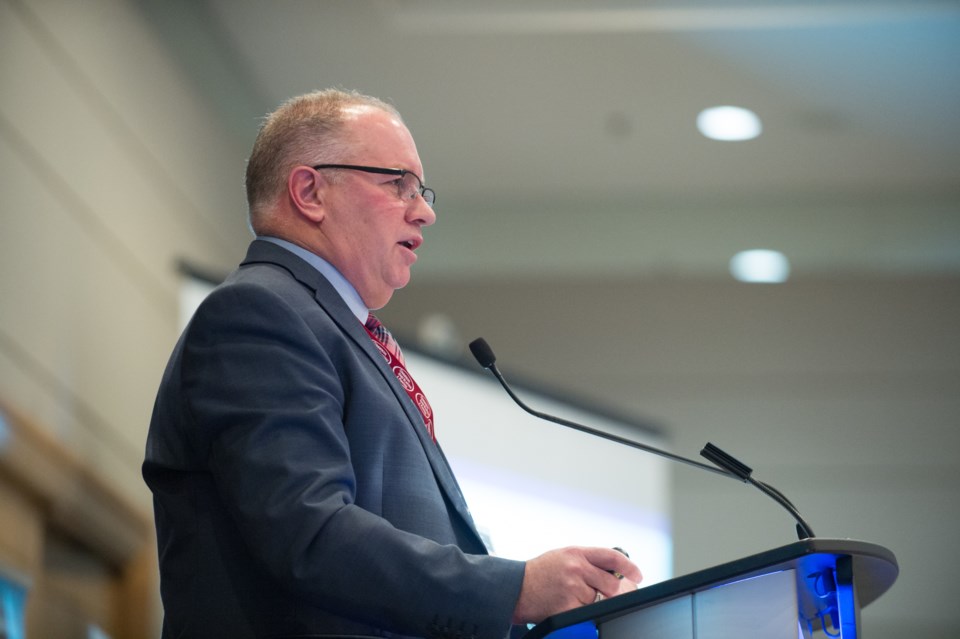Calgary â On Nov. 1 the Petroleum Services Association of Canada (PSAC) released its 2019 Canadian Drilling Activity Forecast. PSAC expects a total of 6,600 wells (rig releases) to be drilled in Canada in 2019. Thatâs down slightly from this year. For 2018, the Associationâs final revised forecast predicts a yearly total of 6,980 wells. For Saskatchewan, the forecast is a decline of 4.3 per cent in wells drilled.
PSAC bases its 2019 forecast on average natural gas prices of $1.45 CDN/mcf (AECO), crude oil prices of US$69/barrel (WTI), a Western Canadian Select (WCS) vs West Texas Intermediate (WTI) differential of US$24.50/barrel, and the Canadian dollar averaging $0.80USD.
Outgoing PSAC president & CEO, Tom Whalen, said in a release, âWhile weâve recovered from the very dark days of 2015 and 2016, there really isnât any cause for celebration in the near term, as drilling activity is in its third year of a plateau, averaging around 6,900 wells per year. The unprecedented, wide heavy oil price differentials caused by our chronic pipeline constraints is nothing short of a crisis for Canada. At current differentials, it exceeds a $100 million cost to the industry and Canada. Today, the only near-term line of sight to added pipeline capacity is Enbridgeâs Line 3 replacement which isnât projected to be in service until at least the third quarter of 2019.
âBased on recent industry analystsâ reports, we currently have approximately 165,000 - 225,000 barrels/day of excess oil supply for the existing egress system. Consequently, we project slightly softer drilling activity in the first half of 2019 than we had in 2018. Weâve seen crude by rail volumes increase to over 200,000 barrels/day in recent months and we know there is more rail capacity building in progress. However, we only see rail providing some limited relief to those operators like Cenovus who are willing to step out and commit to longer-term contracts.â Â
On a provincial basis for 2019, PSAC estimates 3,532 wells to be drilled in Alberta, and 2,422 wells for Saskatchewan, representing year-over-year decreases of 221 and 110 wells, respectively. At 255 wells, drilling activity in Manitoba is expected to drop by 16 wells year-over-year, whilst activity in British Columbia is projected to decrease from 415 wells in 2018 to 382 wells in 2019. Â
PSAC noted the projected total year-over-year decrease of 380 wells equates to approximately $1.5 to $1.8 billion less in capital spending by exploration and production companies. This translates into more pain for the oilfield services, supply and manufacturers as they are already competing for share of a smaller pie thatâs about to get even smaller. This sector continues to suffer as prices for products and services in Canada are severely depressed. This âlower for longerâ is forcing companies to consider alternatives such as moving more of their operations to other jurisdictions outside of Canada in an effort to survive, as reported in PSACâs annual Business Issues Survey.
Whalen continued, âThe on-again, off-again saga of the Trans Mountain pipeline expansion is another blow to investor confidence in Canada. Itâs not a positive signal to investors that it takes state ownership as a âlast resortâ means to move national interest projects forward. While there are numerous barriers to business going forward, if Bill C-69; the new Environmental Impact Assessment Act is passed into law, it is unlikely another major project will ever be proposed or built in this country. Unfortunately, the biggest casualties in this debacle are the hundreds of thousands of middle-class Canadians who rely on the resource sector directly or indirectly for jobs, indigenous peoples who would benefit from jobs, skills training, and economic opportunities to raise them out of poverty, as well as all levels of government that collects royalties and taxes used to support health care, education, and other public infrastructure that benefits all Canadians.
âMarket access and development of our natural resources would not only help reduce global emissions and help lift third-world countries out of energy poverty, but would continue to benefit all Canadians by providing energy security, LNG for remote and northern communities, great high-tech jobs and world prices for our resources so that they can continue to provide economic benefits to communities all across this great country.â
Also on Nov. 1, PSAC announced Gary G. Mar will be the associationâs new president and CEO, effective Dec. 1. In the interim period from November 5 until December 1, Elizabeth Aquin, current senior vice president of PSAC, will serve as acting president and CEO.




